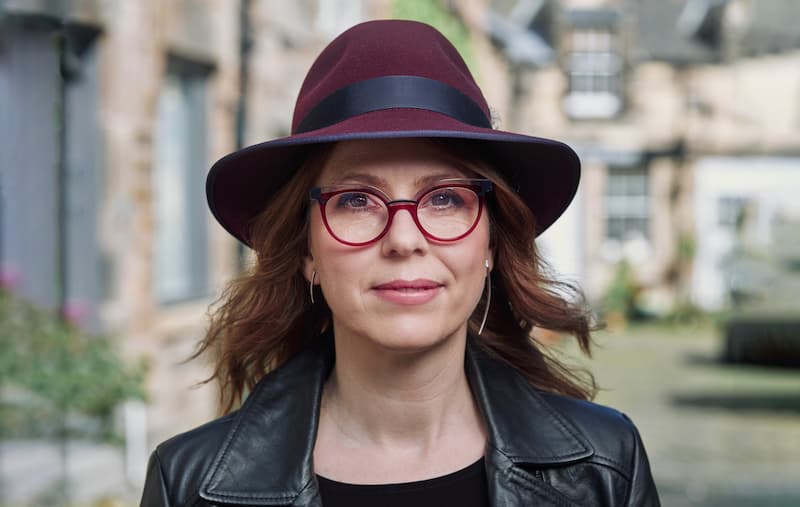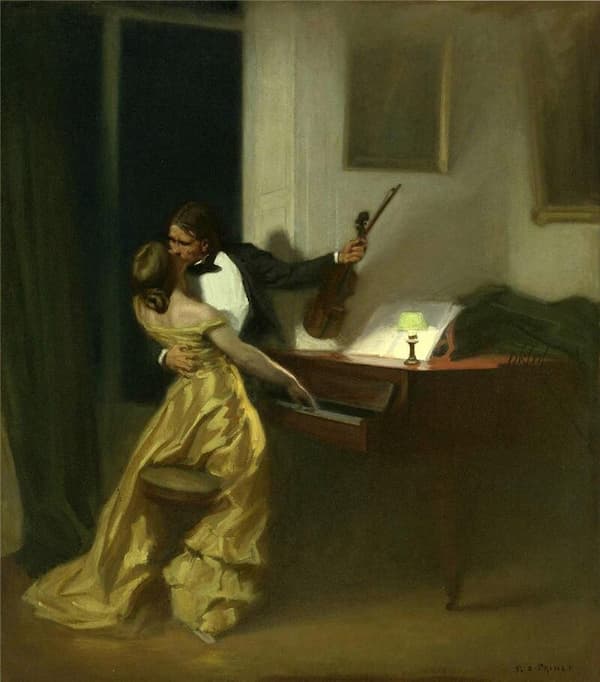English composer Anna Clyne (b. 1980) took Leo Tolstoy’s comment that ‘Music is the shorthand of emotion. Emotions, which let themselves be described in words with such difficulty, are directly conveyed to man in music, and in that is its power and significance’ and used it as the inspiration for her 2020 work Shorthand.

Anna Clyne
Written for solo cello and string quartet (or orchestra), the work also uses two themes from Beethoven’s Violin Sonata, No. 9 in A major, Op. 47, known as the Kreutzer Sonata. The second theme from Beethoven, which was also used by Janáček in his String Quartet No. 1, also known as the Kreutzer Sonata, but this time because it was inspired by Tolstoy’s 1889 novella of the same name.
In Tolstoy’s novella, Pozdnyshev tells how he murdered his wife, believing her to have committed adultery with the violinist Troukhatchevsky. Pozdnyshev had seen them earlier playing Beethoven’s Kreutzer Sonata together and imagined that their love of the music had made his wife an adulterer. When Pozdnyshev first mentions his fear to his wife, ‘she was not at all embarrassed, and began to laugh in the most natural way, so strange did the possibility of being led astray by such a man appear to her.’ At a dinner party, the two sit down to play Beethoven’s Kreutzer Sonata. As Pozdnyshev describes it:
A terrible thing is that sonata, especially the presto! And a terrible thing is music in general. What is it? Why does it do what it does? They say that music stirs the soul. Stupidity! A lie! It acts, it acts frightfully (I speak for myself), but not in an ennobling way. It acts neither in an ennobling nor a debasing way, but in an irritating way. How shall I say it? Music makes me forget my real situation. It transports me into a state which is not my own. Under the influence of music I really seem to feel what I do not feel, to understand what I do not understand, to have powers which I cannot have. … music transports me immediately into the condition of soul in which he who wrote the music found himself at the time. … music provokes an excitement,… and that is why music is so dangerous, and sometimes acts so frightfully.
The husband leaves on a business trip and returns early to find his wife and the violinist at dinner and, suspecting his wife of infidelity, stabs her. She dies a few days later. At that moment, he recognizes that it was his jealousy that caused him to kill her, not her supposed infidelity. Unfortunately, his conclusion is that ‘if I had known what I now know, I should never have married her, never, not for anything’.
The Russian government censored the work immediately, and it wasn’t until Tolstoy’s great aunt Alexandra intervened with Emperor Alexander III that the work was permitted into Tolstoy’s collected works.
In René-Xavier’s 1901 painting, the image is from Pozdnyshev’s imagination – this is what he believed happened when his wife and Troukhatchevsky were swept away by Beethoven’s emotions.

René-Xavier Prinet: The Kreutzer Sonata, 1901
In Clyne’s work, the luscious sound of the cello stands in for all of the emotion that Pozdnyshev had in Tolstoy’s story – restrained and yet filled with desire.
Anna Clyne: Shorthand (version for cello and orchestra) (Yo-Yo Ma, cello; The Knights; Eric Jacobsen, cond.)
In her elegy, Clyne, wordlessly drops us into Pozdnyshev emotional world, even bringing in a Russo-Jewish theme towards the end. Pozdnyshev, isolated and aloof when we first meet him, tells his fellow train travelers how music ended up giving him emotions he could only follow to his doom. Love led him to his doom, but music led the way.
The work received its premiere in July 2020 at the Cramoor Center for Music and the Arts, Katonah with Karen Ouzounian on cello and The Knights as the orchestra.
For more of the best in classical music, sign up for our E-Newsletter


